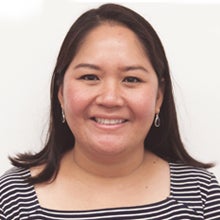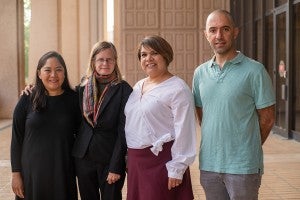 Right: Health Sciences Faculty Patchareeya Kwan.
Right: Health Sciences Faculty Patchareeya Kwan.
The National Institutes of Health (NIH) has awarded CSUN $19 million over the next five years as the second and final award in a ten year effort to support diversity in the biomedical workforce through the undergraduate research-training program, BUILD PODER. The program also establishes a replicable national model for higher learning. Health Sciences faculty Patchareeya Kwan, a member of the BUILD PODER faculty core team said, “The end goal of the faculty core is to increase research grant applications, grant awards and publications in high-impact journals among CSUN faculty and students."
NIH Awards CSUN $19 Million to Support Program to Enhance Diversity in Biomedical Workforce
This story is re-posted from CSUN Today. Read the story in CSUN Today.
The National Institutes of Health (NIH) has awarded California State University, Northridge $19 million over the next five years in ongoing support of its undergraduate research-training program, BUILD PODER, designed to enhance the diversity of the nation’s biomedical workforce.
The grant is the second and final award in a 10-year effort to establish a national model at CSUN that can be replicated at educational institutions of higher learning across the country. In all, the federal government has awarded the university $40 million to support CSUN’s BUILD PODER. BUILD is an acronym for Building Infrastructure Leading to Diversity and PODER stands for Promoting Opportunities for Diversity in Education and Research. The principal investigators on the grant are psychology professors Carrie Saetermoe and Gabriela Chavira, civil engineering professor Crist Khachikian and health sciences professor Patchareeya Kwan.
“Thanks to programs like BUILD PODER, CSUN students have the opportunity to participate in research and hands-on learning throughout their educational journey,” CSUN President Dianne F. Harrison said. “The continued support from the National Institutes of Health enables even more students to experience this high-impact initiative, contributing to student success and the betterment of society through the diversification of our biomedical workforce.”
 The principal investigators on the grant are, from left, health sciences professor Patchareeya Kwan, psychology professors Carrie Saetermoe and Gabriela Chavira and civil engineering professor Crist Khachikian. Photo by Hansook Oh.
The principal investigators on the grant are, from left, health sciences professor Patchareeya Kwan, psychology professors Carrie Saetermoe and Gabriela Chavira and civil engineering professor Crist Khachikian. Photo by Hansook Oh.
In 2014, the NIH awarded CSUN a $22 million grant for five years – the largest in the university’s history — for BUILD PODER. At that time, CSUN became one of 10 sites across the country that host an experimental NIH diversity program that focuses on three core areas: student training for biomedical research careers; faculty mentoring and development; and administrative and institutional transformation.
“BUILD PODER’s vision to transform CSUN’s research culture through a critical race theory framework for biomedical students and faculty is intended to serve as a national model for developing new scholars with innovative and rigorous research questions that will reduce health disparities,” Saetermoe said.
For the student training, to date, 239 students have participated in the program since the first cohort was recruited in 2015. Of these students, 40 percent have already earned bachelor’s degrees. Of those with degrees, 58 percent are in post-baccalaureate, master’s or Ph.D. programs; 11 percent are working in industry as researchers or technicians; and 20 percent currently are applying to graduate programs.
“We believe those are strong numbers, considering that our first cohort graduated nine students in 2017,” said Chavira, co-director of BUILD PODER’s student training core.
Chavira said BUILD PODER’s second phase, which is funded by the new NIH grant, will focus on incorporating the program’s student support and training into the university’s curriculum.
“We also will develop online modules and a facilitator’s guide for other universities who are interested in adopting the curriculum,” Chavira said. “We will include the curriculum in a CSU-wide repository, and we are aiming to test the curriculum at our partner campus, CSU Channel Islands.”
Kwan, part of BUILD PODER’s faculty core, said some of the money from the new NIH grant will be used to enhance faculty and student research and productivity.
“The end goal of the faculty core is to increase research grant applications, grant awards and publications in high-impact journals among CSUN faculty and students,” she said.
To achieve this goal, BUILD PODER provides faculty with funds to implement pilot projects; opportunities to engage in faculty/scholar academies where the educators develop a grant proposal and work one-on-one with more experienced faculty to develop and refine their grant applications; skill-building workshops; expert speaker series and off-campus mentors and training experiences tailored to faculty and student research needs and interests.
Grant writing and awards have increases as a result of faculty initiatives in BUILD PODER. For example, Saetermoe noted, of eight pilot projects awarded by BUILD PODER to CSUN faculty members, five are now NIH-funded.
“For each dollar spent on a pilot project,” she said, “CSUN faculty have generated $8 in external, NIH funding that, in turn, generates new research and opportunities for CSUN students outside of BUILD PODER.”
BUILD PODER also contributed to securing CSUN’s first building dedicated to research, Lilac Hall, which houses four of the program’s faculty members in psychology and health sciences. The hall is also expected to be the home of the program’s Health Equity Research and Education (HERE) center, which will sustain the BUILD PODER program beyond the terms of the federal funding, and serve as the base on an initiative to reduce health disparities in the San Fernando Valley through community-partnered participatory research with local agencies and policy advocates.
This story is re-posted from CSUN Today. Read the story in CSUN Today.
Su 2019
Carmen Ramos Chandler, CSUN Today

